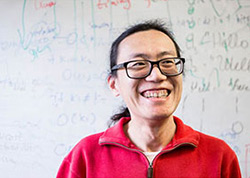NATO Taps UH Professor to Keep Big Data Secure on the Cloud
Researchers to Develop New Computing Technology to Minimize Risks of Data Breaches
In today’s hyper-connected world, cybersecurity is always top of mind for University of Houston computer scientist Larry Shi. He says when it comes to data breaches, it’s not a question of if, but when.

University of Houston computer scientist Larry Shi is the recipient of a $369,803
NATO award to keep big data secure on the cloud. He will be designing a new framework
to protect big data processing and address cloud-based security concerns. (Credit:
Braelyn Coulter)Shi is the recipient of a $369,803 NATO award through its Science for Peace and Security
(SPS) Programme to keep big data secure on the cloud. He will be designing a new framework
to protect big data processing and solve some related problems, such as efficiency,
untrusted system administrators and side-channel threats. He and his team have observed
that certain computing devices have special features that may help address these cloud-based
security concerns.
According to the Identity Theft Resource Center, 169 million personal records were compromised in 2015 through security breaches among business, medical, financial, government and education entities. From enterprise resource planning that helps organizations manage business to customer relationship management to applications monitored via the Web, data is exponentially increasing all over the globe.
“To put it in perspective, in just three years, data growth is expected to reach zettabytes, which is one billion terabytes,” said Shi, referring to a recent presentation done by one of his cybersecurity colleagues. “That means it would take one billion one-terabyte hard drives to store one zettabyte of data.”
Consisting of billions to trillions of records of millions of entities from consumers to retailers to government agencies, big data is the process of collecting, organizing and analyzing massive amounts of facts and statistics to discover patterns and other useful information. Normal data progresses to big data when it becomes too large and complex for processing by traditional database management tools.
From consumer data tracked by companies to individuals posting content on social media to governmental and military agencies storing highly sensitive information and even the metadata sent from sensors embedded in cars, energy meters and smartphones, big data has become part and parcel of daily living. As a result, the need for cloud computing has become ubiquitous.
“Since big data usually requires huge amounts of computation and storage resources, the cloud becomes the natural choice for those tasks,” said Shi, who is an assistant professor of computer science in UH’s College of Natural Sciences and Mathematics. “However, cloud infrastructure is usually managed by a third party, which makes security and privacy of the big data processing a big concern, presenting new security challenges.”
Without solving this challenge, Shi said, it’s hard for some industries to adopt big data technology. While big data has the potential to help companies improve operations and make faster, more intelligent decisions, such as increasing profits or improving operations, the inherent vulnerabilities are a concern and security is the main obstacle to deploying the technology.
“Our proposal is about using specialized computing devices for secure and private big data processing,” Shi said. “NATO expects us to design a new way to protect and safeguard big data processing procedures in the cloud environment. We will be setting up a testbed to use special computing hardware for big data processing. We already have some preliminary results and plan to finish the framework design and deploy a test system in our lab before the end of 2016.”
Looking at the big picture, Shi says all areas employing big data technology will benefit from their research results. Although the technology his team is developing aims at protecting defense sector big data applications, it also will be applicable to other service providers, such as Google and Amazon. Ultimately, they will be developing a new kind of computing technology that minimizes risks of data breaches by securing the computation itself.
“The research also potentially has huge commercial value, because of the growing market in data analytics and related services,” Shi said. “According to some predictions, the big data and analytics market will reach $125 billion worldwide. Security and privacy are the major concerns for running data analytics over third-party infrastructure, and every player wants to provide adequate protection for their customers.”
The SPS Programme provides funding, expert advice and support to security-relevant research, innovation and knowledge-exchange activities jointly developed by a NATO member and partner country. Shi’s project is a joint effort with Korea University. Working with Shi at UH are Lei Xu, a research associate in computer science, and Ph.D. student Kelvin Gao. They will be collaborating with Taeweon Suh, an associate professor in the Department of Computer Science and Engineering at Korea University. Suh is an expert on hardware design and will focus with his team on the engineering part of the project.
- Lisa Merkl, University Media Relations